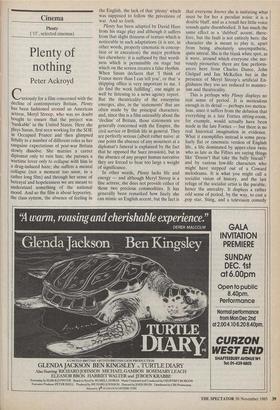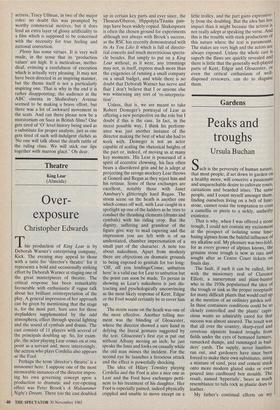Cinema
Plenty ('15', selected cinemas)
Plenty of nothing
Peter Ackroyd
Curiously for a film concerned with the decline of contemporary Britain, Plenty has been fashioned around an American actress, Meryl Streep, who was no doubt bought to ensure that the project was 'bankable' in the United States. Here she plays Susan, first seen working for the SOE m Occupied France and then glimpsed fitfully in a number of different roles as her sanguine expectations of post-war Britain slowly dissolve. She marries a career diplomat only to ruin him; she pursues a wartime lover only to collapse with him in a drug-induced haze; she suffers a mental collapse (not a moment too soon, in a rather long film) and through her sense of betrayal and hopelessness we are meant to understand something of the national mood. And so the film is about hypocrisy, the class system, the absence of feeling in the English, the lack of that 'plenty' which was supposed to follow the privations of war. And so forth.
Plenty has been adapted by David Hare from his stage play and although it suffers from that slight thinness of texture which is noticeable in such adaptations (it is not, in other words, properly cinematic in concep- tion or in execution) the major problem lies elsewhere: it is suffused by that wordi- ness which is permissible on stage but which on the screen creates a false rhythm. When Susan declares that 'I think of France more than I can tell you', or that 'a shipping office is very important to me. I do find the work fulfilling', one might as well be listening to a news agency report. But the theatricality of the enterprise emerges, also, in the 'statements' that are often made by the principal characters: and, since this is a film ostensibly about the 'decline' of Britain, those statements are generally concerned with the Empire, the civil service or British life in general. They are perfectly serious (albeit rather naive: at one point the absence of any mourners at a diplomat's funeral is explained by the fact that he opposed the Suez invasion), but in the absence of any proper human narrative they are forced to bear too large a weight of significance.
In Other words, Plenty lacks life and energy — and although Meryl Streep is a fine actress, she does not provide either of those two precious commodities. It has generally been remarked how finely she can mimic an English accent, but the fact is that everyone knows she is imitating what must be for her a peculiar noise: it is a double bluff, and as a result her little voice sounds quite disembodied. It has much the same effect as a 'dubbed' accent, there- fore, but the fault is not entirely hers: the character she is meant to play is, apart from being absolutely unsympathetic, quite unreal. She is the blank white spot, as it were, around which everyone else ner- vously pirouettes: there are fine perform- ances here from Charles Dance, John Gielgud and Ian McKellen but in the presence of Meryl Streep's artificial En- glishness they too are reduced to manner- ism and theatricality.
This is perhaps why Plenty displays no real sense of period. It is meticulous enough in its detail — perhaps too meticu- lous, since it suffers from the delusion that everything in a late Forties sitting-room, for example, would actually have been made in the late Forties — but there is no real historical imagination in evidence. What it exemplifies instead is some pecu- liarly flat or cinematic version of English life, a life dominated by upper-class twits who as late as the Fifties are saying things like 'Doesn't that take the bally biscuit?' and by various low-life characters who might have stepped out of a Coward melodrama. It is what you might call a socialist vision of history, and the last refuge of the socialist artist is the parable; hence the unreality. It displays a rather odd sense of period, by the way, to cast a .pop star, Sting, and a television comedy actress, Tracy Ullman, in two of the major roles: no doubt this was prompted by worthy commercial motives, but it does lend an extra layer of glossy artificiality to a film which is supposed to be concerned with the necessity for true feeling and national conviction.
Plenty has some virtues. It is very well made, in the sense that its 'production values' are high. It is meticulous, metho- dical, evincing a carefulness of execution which is actually very pleasing. It may not have been directed in an inspiring manner, but the theme itself is not a particularly inspiring one. That is why in the end it is rather disappointing; the audience at the ABC cinema in Shaftesbury Avenue seemed to be making a brave effort, but there was a lot of awkward movement in the seats. And can there please now be a moratorium on Suez in British films? One gets tired of '0' level history being used as a substitute for proper analysis, just as one gets tired of such self-indulgent cliches as No one will talk about the death rattle of the ruling class. We will stick our lips together with marron glace.' Oh dear.



























































 Previous page
Previous page